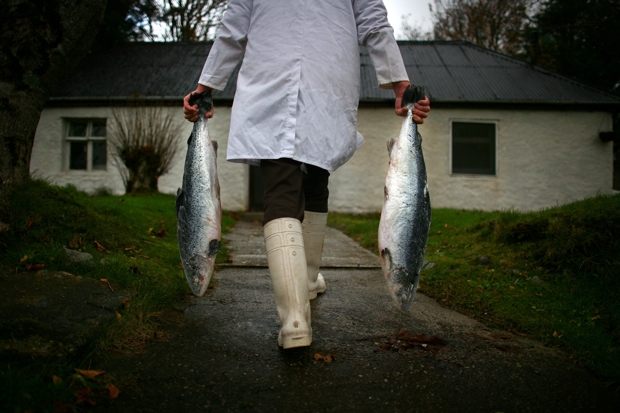Denmark has been basking in a glorious June heatwave this past week, hastening the annual migration cycle. ‘Summer Danes’ are a delicate subgenus of the species. We roam the planet’s warmer regions every year between September and May, absenting ourselves from Nordic noir winters. But mercury rising brings us home; and last week was the warmest early June week in recorded history. So I made my annual pilgrimage to our idyllic local fishing village, Gilleleje, at the northernmost tip of Zealand, a few dozen miles north of Copenhagen.
Though still gorgeous, Gilleleje isn’t what it used to be. Among its many glories, including its beautiful natural harbour, home to Denmark’s fourth-largest commercial fishing port, there was until three summers ago a truly wonderful old smokehouse. This place was a treasure trove of culinary delights. It produced herring, of course, done lots of ways. (A smoked herring is at its most perfect served in traditional Bornholm style – on good rye bread, with chives and radishes, crowned with a whole raw egg yolk). Our smokehouse also produced mackerel, salmon, salmon roe, eel – even potatoes. Have you ever eaten a smoked potato? They are sublime. Anyway, we loved the place – and our British houseguests told us it produced the best smoked fish they had tasted anywhere.
No one knows exactly when Danes started smoking fish in Gilleleje. Thousands of years ago would be a decent stab at an answer; although it took until 1588 before anyone decided to tax the fishermen – initially, somewhere in the range of half a barrel to a barrel of cod per year. Taxes have been on the rise ever since.
But we do know the age-old tradition of smoking fish in Gilleleje has come to an end. Why? Well, the EU determined that, in its words, ‘traditional smoking is risky’. Apparently some of the ash penetrates the food, which could be bad for you. And there is worse: ‘the fire used in traditional smoking poses an increased risk of fire and explosion, and employees may be directly exposed to smoke in the workplace.’ Plus, there is ‘high environmental impact from carbon dioxide emissions and water consumption’. The dreaded bottom line: ‘traditional smoking does not comply with EU guidelines.’
Fortunately, the EU gives with one hand as it takes with another. It sponsors an interesting technology called CleanSmoke, which uses ‘regenerated smoke from smoke flavourings’. It may not entirely surprise you to learn that CleanSmoke requires the purchase of expensive-looking shiny capital goods, including a machine called a ‘closed-loop smoke generator’. The machines all happen to be manufactured in Germany.
Now, for all I know, there is nothing more delicious than herring smoked in a closed-loop generator using regenerated smoke particles. But I wouldn’t know, since instead of sending thousands of Euros to Germany to upgrade his ancient smokehouse to run on resurrected smoke dust, our local smokehouse owner threw in the towel. Thus, in Denmark’s fifth-largest fishing port, the only smoked fish you can buy today is manufactured in a factory in Copenhagen, refrigerated and shipped up the coast. And I can report with sadness that the end product, hitting the tastebuds, is a shadow of its former self (it’s partly the refrigeration: smoked fish is best when it comes nowhere near a refrigerator).
It may well be that the EU’s arguments against traditional fish smoking make perfect sense, and we Danes had been getting it all wrong these past several thousand years. It may even be true that the smoke emanating from Danish smokehouses was vastly worse for the environment than the nitrogen oxide my wife’s VW Golf inflicts upon unborn children. And who knows how many smokehouse workers were immolated in smokehouse accidents over the centuries?
But if the pro-EU brigade really wants to understand why citizens across Europe are so flaming in their anger against the EU, they need ask no further than consumers of smoked fish in Denmark (which is pretty much everybody in Denmark). ‘It is just… crazy,’ says my aunt, mourning the loss of her favourite smoked eel. ‘They are, well… lunatics,’ says my very well-balanced investment manager friend.
Food is really important. Fish are particularly symbolic and emotive – not for nothing are they are everywhere in the Bible, from Jesus making a few go a long, long way, to Jonah setting up home in one, to the ‘fishers of men’ thing and so on. Last week, we saw Justice Secretary Michael Gove becoming emotional on television, as he blamed Brussels for the demise of his adoptive parents’ fish processing and smoking business. Danes seem to feel much the same way. Last December, Danish elites were knocked by the negative outcome of what appeared to be an easily winnable referendum regarding a simple alteration to one of Denmark’s EU opt-outs. But 53 per cent of voters rejected it.
If Britons, surveying the madnesses perpetrated by the EU, and finding those madnesses more maddening than the EU’s purported benefits, decide to vote for Brexit on 23 June, a popular movement to engineer a Danish exit would likely follow. In which case, perhaps one day we will relight the fires of our defunct smokehouses. And with apologies to Douglas Adams, it will be goodbye to the EU – and thanks for all the fish.
| Will Britain vote to leave the EU? Can the Tories survive the aftermath? Join James Forsyth, Isabel Hardman and Fraser Nelson to discuss at a subscriber-only event at the Royal Institution, Mayfair, on Monday 20 June. Tickets are on sale now. Not a subscriber? Click here to join us, from just £1 a week. |







Comments